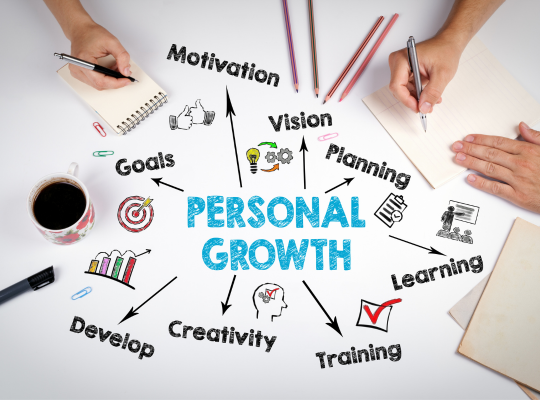Life coaching has evolved over the past few years into a popular avenue for personal development that can help people unleash their potential and improve different aspects of their lives. Life coaching has worked wonders in many domains of personal and professional lives, but two crucial aspects have witnessed tremendous change—Emotional Intelligence (EI) & Relationships. Understanding and improving EI through life coaching can deeply impact how individuals perceive, react to, and manage their own emotions as well as those of others, directly influencing their relationships.
In this blog, we’ll explore how life coaching enhances emotional intelligence and how this improvement creates ripple effects, strengthening personal and professional relationships.
Understanding Emotional Intelligence and Its Components
Emotional intelligence is the ability to identify, understand, and manage emotions in oneself and others. It consists of five main components:
- Self-Awareness – Recognizing one’s emotions and their impact.
- Self-Regulation – Managing or redirecting disruptive emotions and impulses.
- Motivation – Pursuing goals with energy and persistence, even in the face of setbacks.
- Empathy – Understanding the emotions of others and responding appropriately.
- Social Skills – Managing relationships to move people in desired directions.
High emotional intelligence enables individuals to navigate social complexities, resolve conflicts, and communicate more effectively, which are essential skills in both personal and professional relationships.
The Role of Life Coaching in Developing Emotional Intelligence
Life coaching provides you tools, guidance and support to cultivate these elements of emotional intelligence. Let us take a closer look at how life coaching promotes each EI element.
- Self-Awareness through Reflective Practices
Self-awareness is the foundation for growth that life coaching stands on. Through reflective practices, coaches use this knowledge to help the individual gain insight into their thought patterns, emotions, and behaviours. Methods such as journaling, guided questioning and mindfulness exercises are often implemented to promote self-awareness. The clearer sense of self that emerges within clients as they begin to learn why they feel and respond in a certain way becomes a building block for the emotional regulation and compassion needed to connect with others. - Self-Regulation through Goal-Setting and Accountability
Learning to manage emotions and impulses is a primary benefit of life coaching. In addition, coaches also guide the clients to establish coping mechanisms that help them deal with stress, anxiety and frustration. Here, goal-setting and accountability work their magic. Coaches help their client reach goals; ones that are attainable but require emotional discipline and take time. If a client is prone to impulsive reactions during stressful situations, the coach might help them set goals to respond more thoughtfully, offering techniques to pause, reflect, and choose a more measured reaction - Increasing Motivation by Fostering a Growth Mindset
Life coaches cultivate a growth mindset in their clients, encouraging them to view challenges as opportunities for growth rather than setbacks. This perspective helps individuals stay motivated, even when facing obstacles. A life coach can help clients find deeper meaning and purpose in their goals, fueling intrinsic motivation. This heightened motivation supports resilience and perseverance, especially in maintaining and improving relationships.Life coaches help develop a growth mindset in their clients, teaching them that challenges are not setbacks but opportunities to grow. It makes people continue motivating one another, even with barriers in their way. A life coach can assist clients go beyond their desires to help them connect with the meaning and purpose of their goals, thereby energising intrinsic motivation. The motivation level is correlated with resilience and persistence, particularly in the maintenance and enhancement of relationships. - Empathy Development through Active Listening Exercises
Empathy, a vital part of emotional intelligence, is the foundation for healthy relationships. Life coaching also involves role-playing and other active listening exercises to reinforce empathy. These exercises teach clients to listen attentively, consider other perspectives, and respond with understanding. By enhancing empathy, life coaching enables clients to become more compassionate partners, friends, and colleagues, creating an environment where relationships can thrive. - Improving Social Skills with Communication and Conflict Resolution Training
Communication and conflict resolution skills are two of the most important building blocks to healthy relationships. Life coaches work with their clients to make them assertive, active listeners and quality communicators. They may also introduce measures for positive conflict within the group, such as how to respect the differences of opinion and establish a common ground. Through mastery of these skills, clients can develop relationships that are healthier and more satisfying.
The Positive Effects of Emotional Intelligence on Relationships
As emotional intelligence improves, individuals begin to see significant changes in their relationships. Here are some of the transformative effects:
- Enhanced Communication
Great communicators are not less bumpy, but with a high emotional intelligence want to communicate clearly and honestly. People grow as they become adept at expressing their ideas, feelings, and worries more constructively which makes miscommunication less frequent. Such honest, open communication is the basis of trust in any relationship, be it at work or in personal lives. - Increased Conflict Resolution Skills
High-EI individuals do not get into an argument and react quickly; in contrast, they deal with conflicts calmly and empathetically. Life coaching teaches how to handle disagreements with a solution focused mind which is more about fixing the problem and less about pointing fingers. This perspective change reduces hostility, strengthens bonds, and fosters a more harmonious environment. - Greater Emotional Support for Others
Empathy enables a person to feel and recognize the emotions of others. With life coaching, clients gain an increasing sense of empathy which makes them better at listening and being a more emotionally supportive partner, friend or colleague. It reinforces bonding between people and also benefits individuals on an emotional level as it is meant for their growth, happiness, and well-being. - Building and Maintaining Trust
Trust is one of the foundational elements in any relationship, and emotional intelligence aids in creating and sustaining it. Emotionally intelligent people create trust and work to maintain it by promoting honesty, dependability, and accountability. This trust forms the backbone of stable and long-lasting relationships. - Balancing Independence and Connection
Life coaching teaches individuals to value both independence and connection. Through increased self-awareness, individuals learn to set healthy boundaries and respect their own and others’ needs. This balanced approach leads to relationships that are fulfilling and resilient, where both parties feel valued and respected.
The Lasting Impact of Life Coaching on Emotional Intelligence and Relationships
Life coaching doesn’t offer a one-time solution; rather, it provides tools and techniques that clients carry with them for life. As individuals continue to apply these principles, their emotional intelligence and relationships improve further over time. The skills learned through life coaching—self-reflection, emotional regulation, empathy, and effective communication—become ingrained habits, resulting in lasting positive change.
Conclusion
Life coaching is a powerful catalyst for enhancing emotional intelligence, and through this improvement, it transforms relationships. Focusing on self-awareness, self-regulation, motivation, empathy and social skills can endow people with the ability to navigate complexities of human interactions. This growth creates a ripple effect, fostering healthier, more rewarding connections with others.
Whether you’re looking to improve a personal relationship or build stronger professional connections, investing in life coaching can be a transformative step. With the right guidance, you can cultivate emotional intelligence, deepen your relationships, and ultimately, lead a more fulfilled and connected life.







